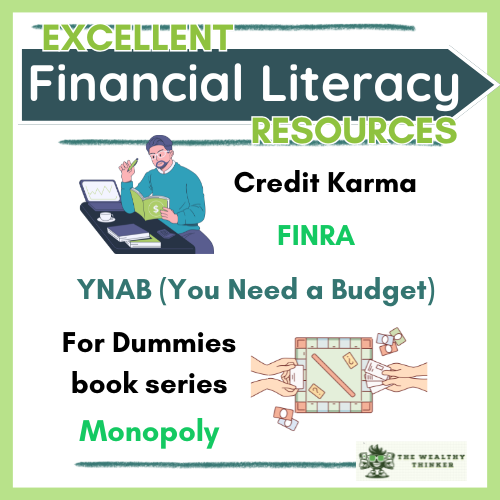If you’ve ever felt overwhelmed by money jargon, confused by credit scores, or unsure how to start building wealth, you’re not alone.
The good news? You don’t have to figure it all out on your own.
Financial literacy isn’t about being a math wizard or memorizing stock tickers — it’s about understanding how money works so you can make confident, informed decisions in your everyday life.
And luckily, there’s no shortage of powerful financial literacy resources designed to help you do just that.
From user-friendly apps that simplify budgeting and tracking, to websites packed with expert articles, books, podcasts, and even games — financial education has never been more accessible (or fun!).
Whether you’re just starting your financial journey or looking to sharpen your money skills, these tools offer practical insights you can use right away.
Ready to take charge of your finances and make smarter money moves?
Let’s dive into 10 of the best financial literacy resources that can help you build a brighter, more secure financial future — one smart decision at a time.

10 Best Financial Literacy Resources
1. Credit Karma
Credit Karma is one of the most comprehensive resources currently available for financial literacy.
With a concentration on credit scores and financial management, this free website provides a wealth of information and tools to enhance your financial literacy and help you accomplish your objectives.
The Credit Karma provides:
- credit score monitoring
- personalized financial advice
- free access to credit report data from the three main credit bureaus
Additionally, you can observe and compare credit card, loan, and insurance offers.
2. Investopedia.com
Investopedia is a comprehensive website for financial education that provides an enormous amount of information on personal finance, investing, and trading.
It provides articles, tutorials, and videos on a variety of financial topics, making it a valuable resource for anyone seeking to increase their financial literacy.
The website’s primary objective is to provide exhaustive and accessible financial education, which it achieves by providing plain explanations and illustrations of financial concepts.
3. Nerdwallet
NerdWallet is a website that provides substantial value through its articles, tools, and reviews.
Individuals and small enterprises have access to the resources, data, and insight necessary for making financial decisions through the platform.
Excellent, well-written articles about personal finance and seemingly infinite offers for credit cards, mortgages, and other financial products are the primary forms of these elements.
You can track your net worth and cash flow, and learn about your credit score on the NerdWallet app.
4. FINRA
If you learn best via data and numbers, FINRA is a tool that offers plenty of data to sift through.
Whether the topic is about one of these topics, FINRA has loads of resources.
- investing for millennials
- financial fraud to avoid as a retiree
- common pitfalls in personal finance
FINRA’s financial literacy quiz is also a great way to assess your financial knowledge and learn how to improve.
Access to these studies, reports, and resources is completely free, making this a fantastic resource to share with employees and students.
5. WealthSimple
WealthSimple may not provide you with educational resources, but it is a good way to get practical in managing your finances. It is a personal finance app that helps you track your expenses and long-term financial goals.
You can:
- set budgets to give you a breakdown of your expenses
- highlight milestones to see which areas you need to cut back on spending
- do calculations to see how much you need to save money for a financial milestone like buying a house
You can also set notifications on spending limits. This way if your spending is nearing the pre-set limit, the app sends you a notification to remind you. This ensures that you stay on the budget and don’t overspend.
6. YNAB (You Need a Budget)
The title of this tool says it all – you need a budget.
If you’ve done any personal finance research, you’ve probably heard of YNAB. If you’ve done any investigation on personal finance, you’ve likely heard of YNAB.
YNAB can appear intimidating to newcomers because it feels like a training camp for your budget. Beginning the method requires a considerable quantity of effort and a high level of self-honesty regarding your financial situation.
However, some personal finance experts believe that this type of intense introspection is what will actually help you achieve your financial objectives over the long term.
7. Books
Books are excellent financial literacy resources – and there are a lot of them out there.
We’ve put together a few lists of personal finance resources that can teach you the basics of money management and personal finance.
- 2025 Goals: 9 Personal Finance Books to Help You Boost Your Wealth
- The 5 Completely Useful Investing Books Every Beginner Needs to Read
- The Top 7 Best Personal Finance Books for Beginners
If sitting down to leaf through pages is a major hindrance for you, you can buy audiobooks and listen at your convenience.
8. YouTube videos
There are many videos and channels that teach personal finance.
However. Given the popularity of social media, you have to be careful that you subscribe to the right ones lest you’ll be getting the same information in a repackaged form.
YouTube channels such as these are a good resource to start with: Top 5 YouTube Finance Accounts That Can Help You With Financial Literacy
Bonus: Humphrey Yang is a former financial advisor and has videos on Credit Cards, Investing and Building Wealth and more.
9. Monopoly
Not many people realize that you can learn the basics of money management from playing Monopoly!
Financial lessons such as these can be learned by playing the game.
- creating and maintaining a cash flow
- building a strong asset base
- being patient and knowing when to stand on the sidelines
- borrowing to invest or
- holding back on investing
Better still, you get to do it with fake money, but the feelings it evokes may be just as real as when you invest in real life.
10. For Dummies book series
The For Dummies book series are excellent financial literacy resources for anyone hoping to learn the basics of any topic including personal finance.
There are books on:
- stock investing
- bonds
- cryptocurrencies
- personal finance
- real estate
It brings down complex financial concepts into simple basic terms which makes it easy for beginners to understand. Any financial topic you are interested in, there are chances that there is a For Dummies book on it. All you have to do is make out the time and read.
Financial Literacy Resources: Your Path to Financial Confidence Starts Here
Improving your financial literacy doesn’t have to feel overwhelming or out of reach.
With so many accessible and practical financial literacy resources available — from apps and websites to books, podcasts, and even board games — there’s something for every learning style and lifestyle.
Whether you’re looking to boost your credit score, build a solid budget, start investing, or just feel more in control of your money, these tools are here to help you grow.
The key is to start where you are, stay curious, and make learning about money a consistent habit.
Remember: small steps lead to big results. The more you understand how money works, the more empowered you’ll be to make smart financial decisions that support your goals — today and for years to come.
Editor’s note: This article was originally published Apr 21, 2023 and has been updated to improve reader experience.



















